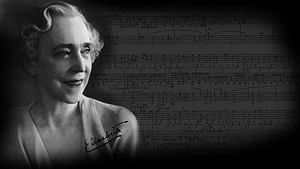Singing
2000
 The
Queen
Elisabeth Competition had already been
established as one of the most prestigious international musical
events when, in 1988, it was decided to add to the violin and
piano the oldest instrument of the world: the voice. Thus the
Singing Competition came into being, held every four years like
the older categories and particularly demanding because of its
length and the different styles imposed to the candidates. The
competition immediately benefited from the know how of its advisers
and an experienced organisation with excellent media coverage.
The
Queen
Elisabeth Competition had already been
established as one of the most prestigious international musical
events when, in 1988, it was decided to add to the violin and
piano the oldest instrument of the world: the voice. Thus the
Singing Competition came into being, held every four years like
the older categories and particularly demanding because of its
length and the different styles imposed to the candidates. The
competition immediately benefited from the know how of its advisers
and an experienced organisation with excellent media coverage.
Success
came quickly. The variety of talents, repertories and styles
gave the bests the opportunity to express themselves with three
different accompaniments: the piano (for lied and melody), the
orchestra of ancient instruments (for opera, cantata and baroque
oratorio), and the symphony orchestra (from the classical era
until today). A piece in the semi-finale (written by the eminent
Belgian composer André Laporte),
allowed an evaluation of the skills of the candidates vis-a-vis
a contemporary score. The jury was of an exceptional standard
- embodying the history of song of the past 50 years - and was
responsible for the difficult task of passing a verdict.
The programme was comprehensive, the standards high and the award
reflected this situation accurately.
The ovation for the winner of the First Prize, contralto Marie-Nicole Lemieux (Canada) said it all. The naturalness of her voice, the quality of her technique, the sincerity of her emotion and her charming approach enchanted professionals and amateurs alike.
The Second Prize for Marius Brenciu confirmed the good impression that this young Romanian natural tenor had made day after day. His vocal qualities and the strength of a well-acquired tradition in opera singing made him remarkable.
Soprano Olga Pasichnyk (Ukraine) had been a favourite from the beginning because of her general quality. Combining beauty and maturity, intelligence and instinct, technique and unusual natural gifts, she made everybody forget until the finale that she took part in a competition. Third Prize and awarded with the "Prix du Public", she seems ready to face the challenges of the big roles in the classical repertory.
Last but not least, Pierre-Yves Pruvot, Lubana Al Quntar and Margriet van Reisen: are three names to remember: already mature, the male voice is elegant and in command, whereas the female voices dispose of a rare timbre which are bound to make those happy who have the good fortune of hearing them.